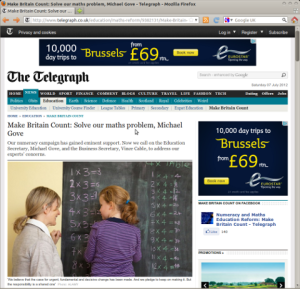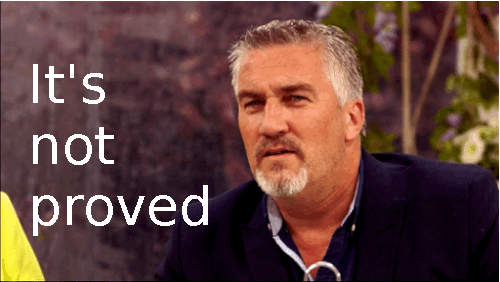Who could have guessed that this non-story about somebody being out of his depth and quite obviously wrong would get so out of hand? Here’s an update on The Continuing Tale Of The Man Whose Claims Couldn’t Be Verified.
You're reading: Posts Tagged: Telegraph
Is this a nonsense formula for the perfect TV episode?
Stardate November, 2014. These are the continuing adventures of the website The Aperiodical. Its mission: to explore the pages of strange newspapers, to catalogue nonsense formulas, to boldly disapprove of them in ways no blog has done before.
What a joy it was to open my browser this morning and see this delicious headline waiting for me:
(by the way, most of the links in this post contain Downton Abbey spoilers. You have been warned.)
In a way, I’m beginning to like nonsense formula stories. You could say that
me + nonsense formula x q = happiness x 2
So, what’s going on this time? Who commissioned it, who sold their soul, and most important of all, does the formula make the least jot of sense?
‘Of little practical value’?
As the heady excitement of the dawn of a forty-eight-Mersenne-prime world dims to a subdued, albeit slightly less factorable, normality, I have taken the opportunity to see what we can learn about the British press’s attitude and ability when it comes to the reporting of big numbers ending in a 1.
Overseas readers may not be aware that the UK’s public service broadcaster, the BBC, is funded by a mandatory annual £145.50 tax on all television-owning households. Therefore, it would be disappointing if some of these funds were not channeled into reporting the discovery in at least five or six separately-produced broadcasts across the organisation’s various radio and television outlets.
Telegraph’s open letter to Michael Gove and Vince Cable on numeracy (presented with arithmetic errors)
The Telegraph have printed an open letter to Michael Gove and Vince Cable summarising its six month numeracy campaign, Make Britain Count. This says that the campaign has “highlighted the crisis we face as a nation in maths education” and call on the Secretaries of State to commit resources, adjust policy and campaign to address the issue.
A wide range of experts and concerned organisations working in education, training and industry have lined up to add their voices to our central contention that underperformance in maths up to 16, and avoidance of it thereafter, have left us with a critical skills gap when it comes to filling the job vacancies that exist right now for the numerate.
The letter gives eight points that the Telegraph feels need to be addressed and promises to return to the issue at the start of the new school year.
Incredibly, the article is presented with a photograph of a blackboard showing incorrect calculations of the four times table ((from $8 \times 4$ onwards. The error, which occurs twice, seems to involve adding $4$ to $28$ and $38$ to get $30$ and $40$, respectively, although the move from $8$ to $12$ is done correctly.)). $10 \times 4 = 38$, does it? Perhaps that only serves to highlight the problem further.

Screenshot of Telegraph webpage showing arithmetic errors on blackboard
Source: Make Britain Count: Solve our maths problem, Michael Gove.
Marcus du Sautoy interview; Marcus supports the Telegraph’s numeracy campaign
Marcus du Sautoy has lent his weight to The Telegraph’s numeracy campaign, Make Britain Count. In an interview covering maths and music, patterns and abstraction and a little about his and his children’s mathematics education, he also talks about how maths teaching in schools could be improved, stating that
in this country there’s an honour in saying you’re bad at maths, whereas in places such as India and China, mathematics is valued by the community. Parents there know that if their kids understand this language, they will be empowered. Sadly, this message hasn’t got across in many European countries yet… It’s got to be something that the whole society takes responsibility for and that is why I’m supporting the Telegraph’s Make Britain Count campaign. We’re not brave enough in our maths education these days. Kids get so bored at school from 11 to 14. They’re not exposed to the really interesting stuff.
Source: Make Britain Count: Marcus du Sautoy joins our campaign.
Prime number puzzles from Matt Parker
As part of the Telegraph numeracy campaign “Making Britain Count”, Matt Parker’s second set of puzzles are online. This time they are themed around prime numbers.
Telegraph: Numeracy campaign: More maths puzzles by Matt Parker.


